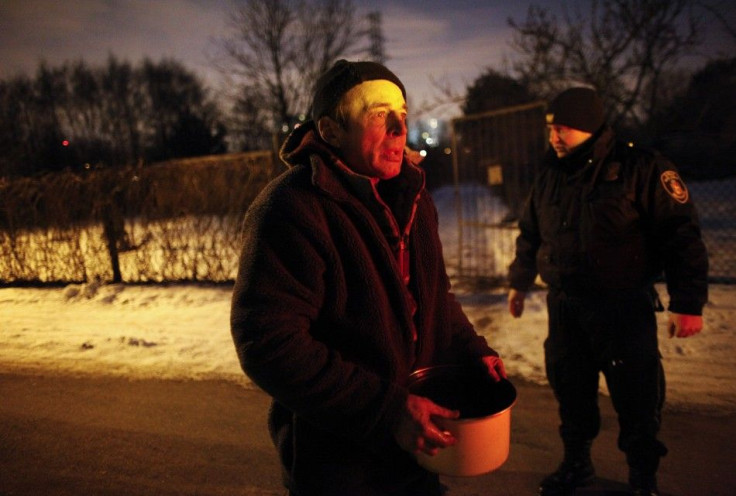Cold Weather: Poland's Homeless Dying in Bitter Winter
ANALYSIS

The extreme cold weather that has swept across Eastern Europe has killed hundreds of people, particularly the homeless.
In Poland, at least five dozen street people have succumbed to the bitter cold that has featured temperatures as low as 20 degrees (Fahrenheit) below zero.
The weather has been so brutal that Poland's Prime Minister Donald Tusk ordered local officials to lift the ban on allowing drunks into homeless shelters.
Police in Warsaw and other cities have encouraged the homeless and indigent into shelters while the brutal cold snap lasts.
According to reports, a great many, perhaps the majority, of Poland's homeless are severe alcoholics. More than 200 Polish street dwellers died last winter from hypothermia, BBC noted.
Warsaw has thousands of homeless, many of whom live and sleep in underground heating ducts. Some are unwilling to enter shelters.
One homeless man told western media: I don't want to go to a shelter. The truth is that I drink alcohol and that's strictly forbidden there.”
Monika Golebiewska, a Warsaw police officer, patrols a beat where many homeless congregate.
Normally, when it's around zero [degrees], it's still ok. But now, it's become dramatic, she told reporters.
Today we gave them white bean soup. Yesterday was the krupnik, a barley soup with bread and tins of food. It's impossible to convince them to go to homeless shelters. They've chosen this life -- they want to stay free.”
But she added grimly: During each patrol, we're afraid we'll find someone who has died.
Despite Poland's relatively strong economy homelessness is a serious problem.
The Polish economy grew by 4.3 in 2011 (following a 3.9 percent jump in 2010), but the country's labor ministry estimated that the unemployment rate leaped to 13.3 percent in January 2012 from 12.5 percent in the prior month.
Poland is better placed than its neighbors to weather the fallout from Europe's debt crisis, but it is still not immune, Capital Economics wrote in a research note.
But clearly, the economic prosperity hasn't trickled down to a substantial portion of the population.
According to the European Federation of National Organizations Working with the Homeless (FEANTSA), there are at least 200,000 homeless people in Poland – though the actual number is likely significantly higher.
“Only 10-15 percent of persons are able to find accommodation provided by organizations working with the homeless,” the group stated. “The homeless often find themselves with no options for shelter or social services.”
FEANTSA research indicates that almost four-fifths of homeless Poles are men; while 60 percent of street people are between the ages of 41 and 60.
Slightly more than half of homeless are alcoholics the group estimates,
Most alarming, about one-sixth of homeless Poles have survived on the streets for a decade or more, while half remain homeless for one-to-five years.
A 2010 report by European Social Watch (ESW) proposed that Poland's transition from a Communist system to a market economy in 1989 threw thousands of people into the streets.
“[The economic] changes affected the whole of Polish society; economic benefits were not distributed evenly and social difference deepened,” ESW stated.
“Long-term negligence of certain issues and vulnerable groups has begun to manifest in Poland.”
In 2008, 17.6 percent of Poles were living in poverty, according to the Central Statistical Office, roughly average for Europe.
“Despite the various ways in which social workers are working with homeless people... only a small percentage of homeless people manage to obtain their own house and become self-sufficient,” ESW said.
“The typical homeless person in Poland is male, over 50 and has been homeless for at least 7 years. He usually has a low level of education and is an abuser of alcohol.”
© Copyright IBTimes 2024. All rights reserved.





















